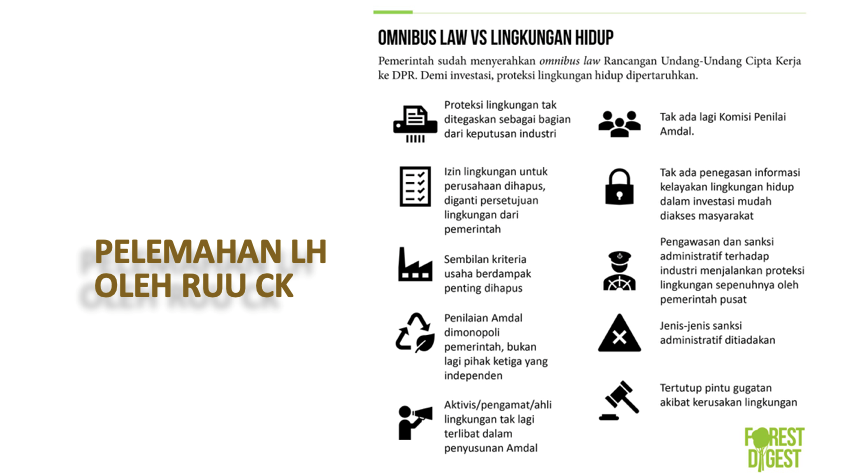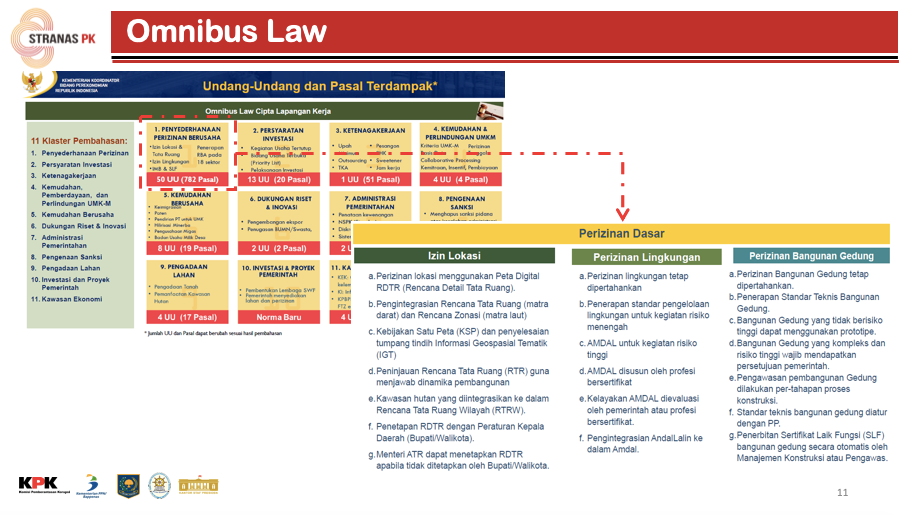On February 12th 2020, the government officially submitted The Job Creation/Cipta Kerja draft bill to the House of Representatives, one of the Omnibus Law bills which later caused controversy, because the process was considered closed and too ambitious. Along with the raised of this issue, PWYP Indonesia held the PWYP Knowledge Forum (PKF) on Monday (17/2), titled “Implications of the Omnibus Law for Spatial Planning and Prevention of Corruption in the Natural Resource Sector/SDA”. Present as speakers were Prof. Hariadi Kartodihardjo (HK), Professor of Forestry Policy, Bogor Agricultural University (IPB), and Muhammad Isro, as representative of The National Corruption Prevention Strategy (Stranas PK).
Through his presentation, Prof. Hariadi considered the Omnibus Law to be an extraordinary form of change, so the public must aware of it. Unfortunately, the public attention is growing slowly. This happened because of unclear information both on the draft bill and academic manuscript.
Furthermore, Prof. HK stated that Omnibus Law had serious implications for spatial planning. This can be seen from several dimensions, including corruption, which according to various studies are considered to be the main reason for the investment problem in Indonesia, and not because of procedural problems as government assumed. “Corruption practices in this field cover various types namely political corruption, law enforcement corruption, licensing corruption, goods & services procurement corruption, and corruption on public service.” These findings are consistent with the data from KPK which shows that Bribery Cases are the highest in the vulnerable period of 2004-2017 with 340 cases or 55%.
Through the results of his study, Prof. HK also explained the existence of political structural problems from the conflict of interest in the regional election in term of funding between the donors and candidates, corruption in the path of Timber Forest Product Utilization (IUPHHK), data manipulation, extortion, until the transaction of particular documents such as Environmental Impact Analysis (Amdal) and other related documents. “There are many counterfeit maps in Riau and West Papua that leads to extortion, offers to increase the area of permits, and the cost of ratifying documents.” He said.
The draft bill of the Omnibus Law on the job creation bill, Hariadi concluded, was not based on real problems in the field, and the government tends to ignore the environmental risk for investment instead of seeing natural resources as a living space.” Due to interest, this pseudo-legal activity has influenced the decision-making process. In fact, the situation of ‘bad governance’ requires a comprehensive solution, not only law” he concluded.

Translate of presentation Prof Hariadi about Cipta Kerja Draft Bill’s Weakening the Environment: (1) environmental protection is not affirmed as part of an industrial decision (2) environmental permits for companies are abolished, replaced by government approval (3) nine business criteria with significant impact are removed (4) environmental impact assessments are monopolized by the government and are no longer an independent third party (5) activists observers/environmental experts are no longer involved in drafting Environmental Impact Analysis (EIA) (6) there is no EIA Assessment Commission (7) there is no confirmation of environmental feasibility information in investments easily accessible to the public (8) supervision and administrative sanctions for industry on carrying out environmental protection completely taken by the central government (9) types of administrative sanctions are abolished (10) claim on environmental damage is closed.
On the other hand, Muhammad Isro as a member of the Stranas PK Team said that based on Presidential Regulation 54/2019 and the Joint Decree, one of the focuses and actions of Stranas PK in 2019-2020 is related to licensing and trade that is to improve data governance and compliance in the extractive sector, forestry, and plantation. One of the tools that are used is through the One Map policy.
“The pilot project for implementing the One Map Policy was carried out in Central Kalimantan, West Sulawesi, East Kalimantan, Riau and Papua, in collaboration with cross ministries, Geospatial Agency, and the local provincial government” Isro said.
The one map policy stage starts with data sharing, synchronization, integration and compilation. These data include Decree (SK), map attachments, and, digital maps. “After the compilation process is complete and integrated with the base map, synchronization will be carried out so that the IGT PITTI (Indicative Overlapping Map of Thematic Geospatial Information) is released.” However, the main obstacle found is the lack of data regional decree, map attachments and its shapfiles.
Regarding the Omnibus Law, the Spatial Detail Plan (RDTR) is said to be key in encouraging licensing. This is automatically included in the focus of the Stranas PK work because RDTR is in the One Map policy. “RDTR is one of the instruments to cut the implementation problem, which is related to Online Single Submission, One Map Policy, and Forest Area Determination. The acceleration of the preparation for this RDTR, said Isro, will be monitored through http://jaga.id/monitoring
“RDTR needs based on data from the Director-General of Spatial Planning almost amounted to 2000 RDTR. While the current position is only around 50. Hence, in our opinion, if the CK Bill will be enacted and linked to OSS, I think that is not ready yet.”

Both speakers agreed that the involvement of the community in the process of drafting the Omnibus Law on the Cipta Kerja Bill is a must. Prof. Hariadi conveyed that civil society can conduct Corruption Impact Assessment (CIA), which is checking whether article/subsection in the CK Bill provides space for corruption. This CIA can be used as data to think about the negative impacts if CK Bill is implemented. Recommendations in the form of risk advocacy are also necessary to convey the government if there is horrible potency when this bill is applied such as the vulnerability of social conflict to an area. Prof Hariadi was considering the diverse social conditions in each region of Indonesia by giving the example the CK Bill might be suitable if applied on Java, but not suitable for Papua.
For the information, the government is on its way to compile 4 (four) Draft Laws (RUU) of the Omnibus Law, namely the Bill on the State Capital (IKN), the Bill on Pharmaceuticals, the Bill on Job Creation, and the Bill on Taxation Provisions and Facilities for Strengthening Economy. At present, the Omnibus Law bill package has been included as part of the 50 bills which becam in the 2020 National Legislation Program (Prolegnas). (WC/AA)